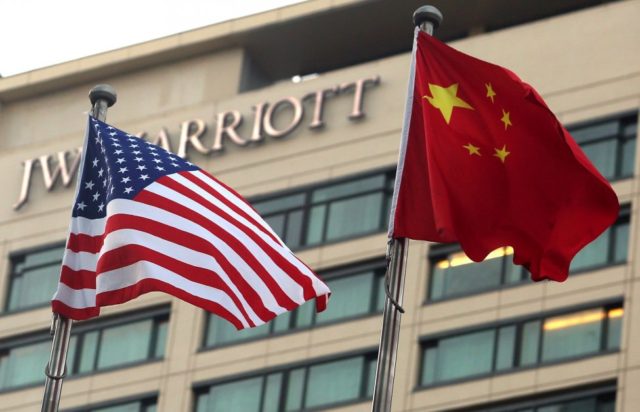March 18 (UPI) — U.S. and Chinese officials traded barbs Thursday in Alaska as they met for the first time under the new administration of President Joe Biden.
During the meeting in Anchorage, U.S. Secretary of State Antony Blinken and national security adviser Jake Sullivan said the United States intended to discuss “deep concerns” about some of China’s actions internationally, while Chinese diplomat Yang Jiechi and State Councilor Wang Yi accused the United States of hypocrisy in regards to cybercrimes and human rights abuses, CNN reported.
Blinken told reporters before the meeting that China’s cyberattacks, internment of Uighur Muslim minorities in Xinjiang, new restrictions in Hong Kong, action against Taiwan and trade tensions with Australia “threaten the rules-based order” responsible for maintaining global stability.
“That’s why they’re not merely internal matters and why we feel an obligation to raise these issues here today,” he said.
Yang countered by staying that the United States is the “champion” of cyberattacks and questioned the state of U.S. democracy, while Wang siad China wouldn’t accept “unwarranted accusations from the U.S. side.”
“We believe that it is important for the United States to change its own image and stop advancing its own democracy in the rest of the world,” Yang said. “Many people within the United States actually have little confidence in the democracy of the United States.”
Following extended opening remarks by the Chinese officials, CNN reported that Blinken called for media to return as he retorted by saying that he had heard “deep satisfaction that the United States is back, that we’re re-engaged with our allies and partners” during talks with other nations.
“I’m also hearing deep concern about some of the actions your government is taking,” he said.
He also responded to the criticism of U.S. affairs, saying that the nation is on a “constant quest to, as we say, form a more perfect union” which acknowledges “that we’re not perfect.”
“We make mistakes. We have reversals, we take steps back. But what we’ve done throughout our history is to confront those challenges — openly, publicly, transparently — not trying to ignore them, not trying to pretend they don’t exist,” Blinken said. “Sometimes it’s painful. Sometimes it’s ugly. But each and every time we’ve come out stronger, better, more unified, as a country.”
Earlier this week, Blinken said there are new U.S. sanctions against two dozen Chinese and Hong Kong officials and members of the National People’s Congress Standing Committee, whose actions undermined the high degree of autonomy promised to Hong Kong when the city returned to Chinese rule in 1997.
China had a contentious relationship with former President Donald Trump as the two largest economies in the world exchanged a series of tariffs on imports and exports, and later tensions over the origins of COVID-19.
Chinese Ambassador to the United States Cui Tiankai said Wednesday Beijing will not compromise on its core interests and issues.
“For any dialogue between countries, a basic prerequisite is that both sides should have the spirit of equality and mutual respect,” Cui said in a report by Xinhua. “When its core interests are involved, China has no room to back down. This position will also be clearly articulated in the dialogue.”
Biden met last week with the leaders of Indo-Pacific region allies Australia, Japan and India in the Quad summit. While China was not part of the agenda, some observers saw it as a unifying event to oppose China’s expanding influence in the region.

COMMENTS
Please let us know if you're having issues with commenting.